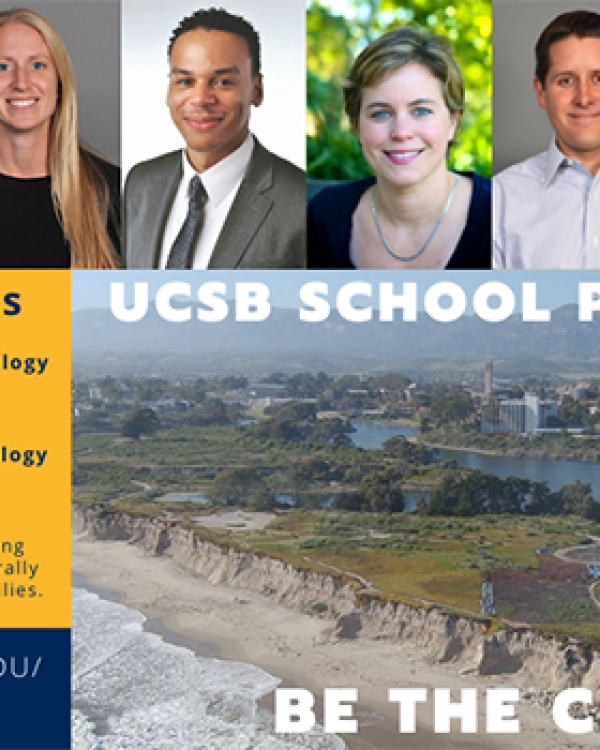
UC Santa Barbara’s School Psychology faculty are accepting applications for both the Master’s Degree program in school psychology and the Doctoral Degree program in school psychology. The new, terminal three-year Master’s is for those who seek to be practitioners in the field; the five-year doctoral program is for those seeking to become faculty members.
School psychology—A career that makes a difference
School psychologists can make a positive, lasting difference in children’s lives, helping to unlock each child’s potential for success. School psychologists apply expertise in mental health, learning, behavior, and development to help children and youth succeed academically, socially, behaviorally, and emotionally. They provide assessment, support, and intervention services to students; partner with families, teachers, and other professionals to create safe, healthy, and supportive learning environments; work with school administrators to improve school-wide policies; and collaborate with community providers to coordinate services for students in the schools.
UCSB supports ethnically, culturally, and linguistically diverse students and families
UCSB has developed a model program for the preparation of school psychologists to support ethnically, culturally, and linguistically diverse students and families. These efforts are consistent with the mission of the Department of Counseling, Clinical, & School Psychology to engage in scholarship and prepare professionals who will foster the psychological well-being and social equity of all people, especially vulnerable populations. These efforts are also consistent with further educating and preparing students at UCSB to actualize UCSB’s commitment as a Hispanic Serving Institution (HSI) and Asian American Native American Pacific Islander Serving Institution (AANAPISI). The program is committed to meeting the rising need and demand for highly-skilled, well-prepared, and culturally-responsive school psychologists, especially from underrepresented backgrounds in the field of education, to serve school children in California and across the U.S. The program is engaged in professional activities to advance diversity, equity, inclusion, social justice, and antiracism, including signing on our commitment to the School Psychology Unified Antiracism Statement and Call to Action.
UCSB brings science to practice
The UCSB Master’s of Education (M.Ed.) in School Psychology program implements a Science-to-Practice model, emphasizing the implications of research findings in psychology and education for psychological services in school settings. The program emphasizes the analysis of problems encountered in school settings from a scientific/evaluative/research point of view. It recognizes the need for school psychologists to apply research-based skills and evidence-supported strategies to assist all students to learn and maximize their human potential. This means that school psychologists work with general education students and with students who have special learning needs. In addition to core content courses, this analytical perspective will be complemented by ongoing fieldwork experiences in local schools and agencies. These practicum experiences are closely supervised by both university- and school-based supervisors.
UCSB integrates theory, research, and fieldwork
The UCSB school psychology training model emphasizes the integration of theory, research methodology, professional role development, and practice/skills, with an emphasis on developing strong research and data analysis skills. The theoretical areas of study include strands in human development, prevention/interventions, assessment, consultation, programs and services, legal/ethical, as well as evaluation/research. Research methodology includes courses in research, evaluation, and quantitative analysis. Professional role development involves the engagement of students in reading and active discussion about the changing role of the school psychologist. Field-based practice and skill development is accompanied by university-based supervision designed to integrate the areas of theory, research, and role development with what the students are experiencing in the field. Effective scholarship and provision of support services also requires awareness, knowledge, and skill development in working with diverse populations. Therefore, there is an emphasis on how existing knowledge and skills can be applied and adapted to serve every child and identifying further opportunities for future scholarship to inform practice. Particular attention is given to scholarship that facilitates the learning of children from historically marginalized and underserved communities. Students engage in fieldwork across all three years of enrollment. Each quarter, student performance and professional development is evaluated by external and internal supervisors.
UCSB meets state and national credentialing standards
In the 3-year M.Ed. program at UCSB, all students proceed through the same sequential cohort model program to fulfill the necessary program requirements. This includes 60 units for the M.Ed. (which is awarded by UCSB) and 24 additional units for the PPS credential (awarded by The California Department of Education – Commission on Teaching Credentials – Pupil Personnel Services Credential). Students in the UCSB doctoral program complete a 5-year program. The final year for the M.Ed. and Ph.D. program is a full-time internship, which can be completed in state or across the country. Completion of coursework fulfills the external accreditation requirements that are consistent across the National Association of School Psychologists and the California Department of Education for the professional preparation and credentialing of school psychologists. Graduates of the M.Ed. and Ph.D. programs will be credentialed to practice school psychology in the state of California and be eligible for distinction as a Nationally Certified School Psychologist.